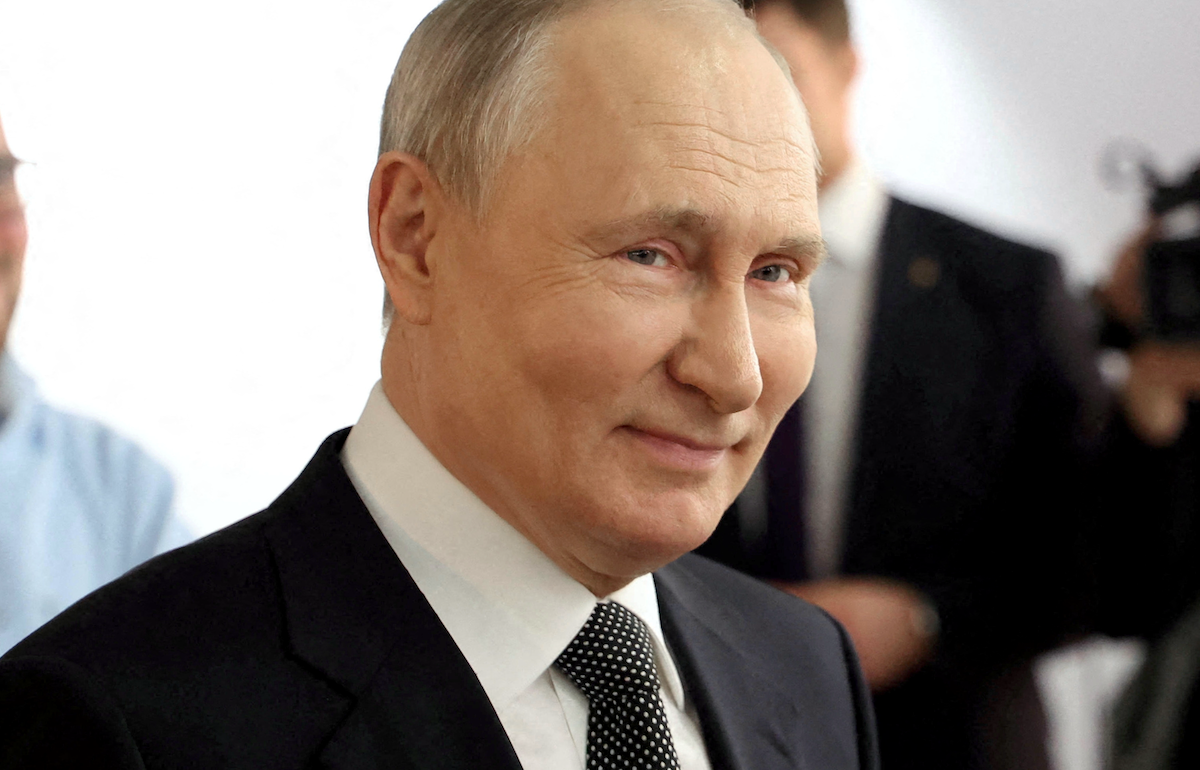Amid tight control of dissent, a crackdown on the opposition, and a big pressure campaign to get voters to the polls, there is little doubt President Vladimir Putin will win another term in office in elections being heldon March 15-17. Still,the Kremlin is working hard to ensure a strong showing for the 71-year-old leader who has ruled the country for 25 years. Displays of public support are important for his legitimacy.
Eurasia Group expert Alex Brideau says one important watchpoint will be whether the followers of opposition leader Alexei Navalny, who recently died in a Russian prison, can organize a symbolic protest vote. We sat down with Alex to learn more about what to expect in the election and the strength of the Putin regime.
What steps is the Kremlin taking to ensure Putin’s victory?
The Kremlin is not worried about Putin losing the election, but it doesn’t want any big surprises. The authorities have ensured that voters have few options when choosing the president. Along with Putin, three other candidates represent loyal opposition parties that lack substantial public support. The state’s repression of critical politicians and activists through arrests, bans on activities and fundraising, exile, or killings has been so strong that there were few real opposition candidates capable of rallying large numbers of voters. Those who tried this time to get on the ballot failed to get past the Central Election Commission.
Putin’s team also has been working with regional and local officials to ensure that both turnout and support for the president will be high. It is aiming for 70%-80% of the vote, according to independent Russian media outlet Meduza. Government employees, soldiers, and people working for state-owned companies will be under pressure to vote and ensure others vote for Putin, too.
Will Navalny’s death have any impact?
The crowds that gathered in Moscow to say farewell to Navalny showed that people will show their opposition to Putin, if very cautiously. Still, there is no candidate on the ballot to rally those voters. Navalny’s organization has been hounded by the security services since his arrest in 2021, making it hard for them to have an effect. But they will nevertheless try. Navalny’s widow Yulia has encouraged people to vote for anyone other than Putin, while others have encouraged opponents to do this together at noon on the 17th. The tactic won’t stop Putin from winning, but it could embarrass the regime if enough voters follow their advice.
What do you make of the level of support garnered by anti-war candidates before they were barred?
Two candidates running on anti-war messages tried to get on the ballot: Ekaterina Duntsova and Boris Nadezhdin. This offered an imperfect gauge of anti-war sentiment in January, when thousands of people lined up in cities across the country to give Nadezhdin the needed signatures to become a candidate. But Russian authorities stepped in and both politicians were barred from the ballot on technicalities widely seen as a way to ensure their anti-war campaigns would not continue.
Nonetheless, it is important to note that Putin has not shied away from talking about the war while campaigning. Instead, he has expressed optimism about continued success in the invasion and has not dialed back his previously declared objectives for the war. He has also played up his narrative of a threat from NATO and the West.
What other indications do we have about the true level of public support for Putin and the war in Ukraine?
Experts continue to debate the reliability of opinion polling in Russia, especially as repression has increased. At the very least, polls like those from the independent Levada Center have shown Putin gets consistently high backing in the upper-70% to mid-80% range. Putin’s apparent high popularity has long been an important part of how he demonstrates his legitimacy and manages Russia’s elites.
Polls also show the public’s consistently strong support for Russia’s military actions in Ukraine. However, they also show contradictory views on the issue. A majority support negotiations to end the war, but a majority also opposes giving back any occupied Ukrainian land to secure peace. Mobilization is not popular, something seen during the partial mobilization drive in the fall of 2022. Putin appears sensitive to this and has stated multiple times that a new mobilization won’t be necessary.
How would you place the level of repression in Russia now in a historical context?
Dissent in Putin’s Russia has always carried some risk, but the last three years have seen the highest level of repression in Russia’s post-Soviet existence. It started in the wake of Navalny’s 2021 imprisonment and expanded as Russian authorities used the war to further clamp down on dissent. The public now has very few legal outlets to protest government actions.
It’s hard not to see some similarities to the Soviet era's use of the security services, and their tactics, to squash opposition to the regime. But the societal control Russian officials can muster today through arrests, intimidation, and censorship is not nearly on the same level as what the Communist Party exerted over the everyday lives of Soviet citizens.
What would it take to loosen Putin’s grip on power?
Putin enters this election confident about the war and an economy that has grown despite major Western sanctions. But the war and the economy present a risk to him if they falter down the road. Moreover, some of the biggest protests during Putin’s time in power have been reactions to corruption or the abuse of power. The lack of outlets to oppose the government without fear of jail or fines creates a danger for the Kremlin: that an incident triggers spontaneous unrest that spreads nationwide. That said, Putin will enter his next term quite firmly in power, with little to suggest that he is under threat of losing control anytime soon.
Edited by Jonathan House, Senior Editor at Eurasia Group
